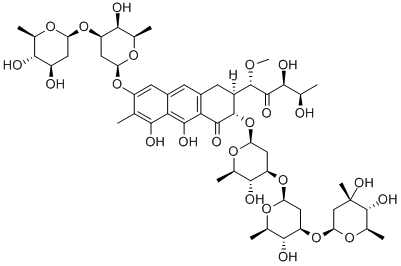18378-89-7
 18378-89-7 結(jié)構(gòu)式
18378-89-7 結(jié)構(gòu)式
基本信息
光神霉素
光輝酶素
普卡霉素
光輝霉素
普卡酶素
光神霉素A
光輝霉素A
普芳拉星,金霉酸
光神霉素,光輝霉素A
pa144
a-2371
nsc24559
MITHRACIN
PLICAMYCIN
mitramycin
MITHRAMYCIN
aurelicacid
aurlelicacid
物理化學(xué)性質(zhì)
安全數(shù)據(jù)
應(yīng)用領(lǐng)域
| 報(bào)價(jià)日期 | 產(chǎn)品編號 | 產(chǎn)品名稱 | CAS號 | 包裝 | 價(jià)格 |
| 2025/02/08 | HY-A0122 | 光輝霉素 Plicamycin | 18378-89-7 | 1 mg | 1244元 |
| 2025/02/08 | HY-A0122 | 光輝霉素 Plicamycin | 18378-89-7 | 2 mg | 1990元 |
| 2025/02/08 | HY-A0122 | 光輝霉素 Plicamycin | 18378-89-7 | 5mg | 4160元 |
常見問題列表
Sp1 transcription factor
Sp1 is a zinc-finger transcription factor that regulates multiple cellular functions and promotes tumor progression by controlling expression of genes involved in cell cycle, apoptosis and DNA damage. Sp1 binds to GC-rich motifs of promoters and interacts with components of the general transcriptional machinery and co-activator complexes of multiple signaling pathways. Plicamycin (Mith) decreases Sp1 protein by inducing proteasome-dependent degradation, thereby suppressing cervical cancer growth through a DR5/caspase-8/Bid signaling pathway. To assess the antiproliferative effects of Plicamycin on cervical cancer cells, two cervical cancer cell lines with different genetic backgrounds are grown with or without treatment with Plicamycin at different concentrations. Plicamycin inhibits HEp-2 and KB cell growth in a concentration-dependent manner after 48 h. Apoptotic cell death is qualitatively estimated by DAPI staining for nuclear condensation and fragmentation. Plicamycin leads to significant DNA fragmentation compared to untreated controls.
The antitumorigenic activity of Plicamycin (0.2 mg/kg/day) is determined in a xenograft model and observed reduction in tumor volume and weight. No significant mouse body weight loss is observed in Plicamycin-treatment groups, indicating that Plicamycin-associated toxicity is minimal. Plicamycin also increases TUNEL-positive cells in tumor xenografts. No notable intergroup differences are observed among organs, indicating no marked signs of systemic toxicity at the Plicamycin dose used in this study.
